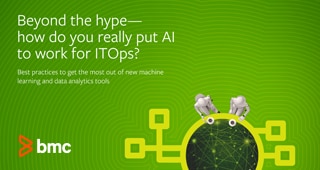
Cloud computing represents one of the most misunderstood yet valuable innovations in current IT and business strategies. As an I&O leader, it can be challenging to find the right mix of cloud computing capabilities, especially amidst the constant influx of information and solutions available to you.
Cloud Computing Assumptions for I&O Leaders Debunked
Cloud computing has enabled Infrastructure and Operations leaders to make huge strides in digital business transformation. However, the constant evolution of enterprise cloud technology does not come without question marks. As you evaluate which technology is the most cost-effective, drives the highest value, and enables your development community to innovate, you may be challenged to determine the right solution for your organization. The influx of information available and the constantly changing cloud technology developments make it difficult to discern what cloud strategy is right for your business. We set out to cut through preconceived notions about the right cloud strategy for your I&O organization and debunked some of the cloud myths plaguing leaders today.
Is an exclusive cloud strategy the only way to go?
There’s no question that cloud computing can be hugely beneficial to an organization. The enterprise-wide benefits typically include a reduction in provisioning times, predictable and optimized costs though virtualization and automation, and the ability to derive “infrastructure as code” deployments. What isn’t always clear is if cloud computing is the only way to get such benefits. Is the public cloud the only resolution to infrastructure virtualization and automation? Gartner reports that many of the benefits that are coined advantages of the cloud, especially virtualization and automation, can be gained without the additional effort needed to deploy a cloud environment. According to Gartner, do not consider a cloud deployment if you do not need cloud attributes (for example, elasticity, chargeback/showback, etc.)
IaaS Cloud Strategy: Workload placement and sourcing analysis should be a key piece of the puzzle
A Gartner survey conducted in March and April of 2016 of worldwide companies with over $1 billion in revenue stated that cloud computing is often used synonymously with public cloud service. This is because public cloud service is growing at a faster rate than private cloud services. It’s safe to assume that this trend will continue, as digital enterprises break down barriers to achieve the transformation required to stay competitive. Private IaaS cloud deployments have had mixed success, plagued by some ineffective vendor tooling, enterprise immaturity in some key building block areas like virtualization, automation and standards, and application of private clouds to the wrong requirements. While the cloud should be at the center of your IaaS strategy, there are numerous workload characteristics that you should evaluate and consider before deciding whether to deploy a public or private cloud environment.
Gartner Recommends
Highly Mature Environments
We believe that if you have a highly mature environment, a private cloud strategy may be the correct strategy for your organization. To that end, Gartner further qualifies the consideration: “A highly mature environment (heavily virtualized and automated) with scale (more than 1500 virtual machines) where a public cloud might not be cost-effective (for example, excessive bandwidth costs with moving data).” I&O leaders should consider private IaaS clouds as a part of their overall strategy, states Gartner.
Highly Integrative Environments
While a hybrid cloud strategy has become more standard throughout the industry, we believe that there are scenarios where a combination approach between the public and private cloud may not be suitable. For instance, in highly integrated environments a partial move to the private cloud may be challenging. “A need for maintaining a highly integrative application environment where portions of the system cannot be moved in isolation to a public cloud in isolation” should consider private IaaS clouds as a part of their overall strategy, states Gartner.
Tightly Controlled Environments
If you are managing data with strict data privacy and compliance needs, a public cloud vendor may not be able to handle the tight control necessary to ensure the security of your data. Furthermore, “A need or desire for tight control (for example, for security, data locality, data privacy and compliance reasons) and a concern that [you] cannot achieve this with a public cloud vendor,” states Gartner, may be grounds to consider private IaaS clouds.
If any of these considerations are resonating with your organization, we believe a private cloud deployment may be the right forward path. But, that doesn’t necessarily mean an on-premise deployment, built, supported, and managed by your staff is mandatory. A hosted private cloud or an offering managed by a third-party eliminates the need for your team to add another responsibility to your ever-growing list.
Application developers should be driving container-related technology, not I&O
Containers are a key component to successful application development and maintenance. The isolation boundary they create puts an end to entire server disruption rooted from a single application or infrastructure instance and eliminates compatibility problems between applications. Application development and maintenance has been transformed by the automation and elasticity provided by containers. The growing popularity of containers over hypervisor-based virtual machines has created questionable adoption by I&O leaders.
According to Gartner, containers are primarily geared toward enhancing developer productivity. Secondary I&O benefits can be gained with OS containers that leverage Docker through denser packing of hardware, but containers are most often for developer productivity. To determine whether or not a container strategy is the right path for your organization, we believe collaboration with your developer community is imperative. A keen understanding of their requirements for IaaS and how it supports their platform plans will help you determine whether or not you should invest in container technology.
As an I&O leader, you have a unique, in-depth knowledge of your IT infrastructure, your business services, and insights on end-user behavior. Your ability to measure and monitor many facets of the IT infrastructure enable you to be an innovation catalyst at the forefront of cloud computing best practices.
For a deeper look at cloud computing assumptions that I&O leaders must avoid, read the Gartner report.
Get practical guidance for AIOps
These postings are my own and do not necessarily represent BMC's position, strategies, or opinion.
See an error or have a suggestion? Please let us know by emailing blogs@bmc.com.







